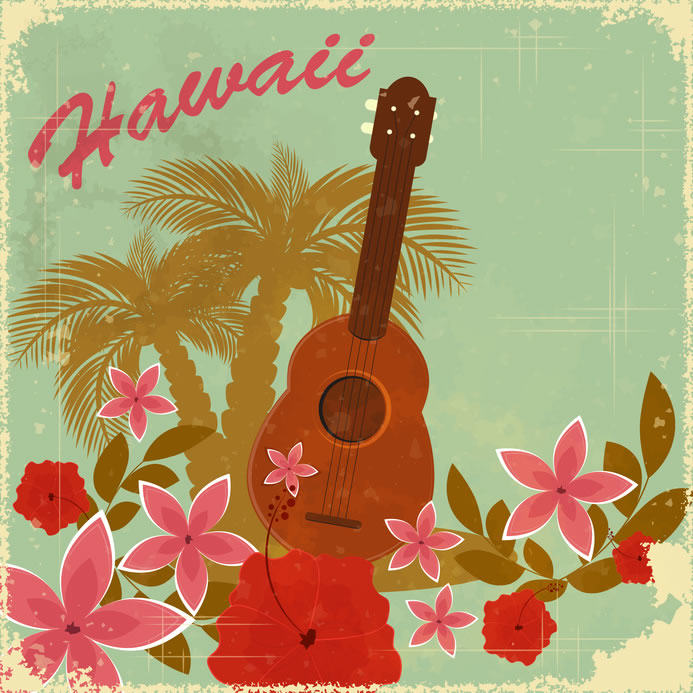I wrote in an earlier blog about the history of one of Hawaii’s most revered icons, Duke Kahanamoku. During a recent leisurely stay at a beautiful Oahu vacation rental I decided to focus on two more icons. Here is some interesting information about the two other revered people of Hawaii’s past: Israel Kamakawiwoole, also known as Bruddah Iz, and Eddie Aikau, whose name is still often heard in the phrase “Eddie Would Go.”
A pure-blooded Hawaiian, Israel Kaanoi Kamakawiwoole (1959-1997) was born on May 20, 1959. He lived in Oahu’s Palolo Valley until the age of ten, and that is when his family moved to Makaha, an Oahu beach town. The next year Israel began playing music with his brother Skippy, and within a few years they joined with Jerome Koko and also Louis “Moon” Kauakahi as well as Sam Gray, and these musicians formed the Makaha Sons of Niihau.
The Makaha Sons released ten albums during the next 15 years. They also toured the United States and won numerous Na Hoku Hanohano awards. Another popular thing they did was to host an annual Makaha Bash on Memorial Day at Oahu’s Waikiki Shell.
Israel’s brother Skippy Kamakawiwoole passed away in 1982. That was the same year Israel married his childhood sweetheart, Marlene Kuupua Ah Lo. Israel and Marlene then had a daughter Ceslieanne Kamakawiwoole.
Iz began his solo career in 1993 when he released the album Facing Future. Soon Israel was the most popular entertainer and singer in Hawaii, and his album was the first Hawaiian album to sell more than one million copies in the U.S. The album N DIS LIFE was released in 1997. The album won four Na Hoku Hanohano awards: Favorite Entertainer of the Year; Male Vocalist; Island Contemporary; and Album Graphics.
Israel passed away due to respiratory failure at age 38 on June 26, 1997. The renowned Hawaiian musician was memorialized by thousands of people at the State Capitol Rotunda. Fondly known as Bruddah Iz, his ashes were scattered off Makua Beach. Though he was famous around the world, Israel was said to be the alii (royalty) of the common people of the Hawaiian Islands. In 2001 a new CD, Alone in IZ World, was released, and immediately the album became a top seller.
Eddie Aikau became an indelible part of Hawaii’s history in 1978 when the Hokulea voyaging canoe capsized off the island of Molokai. Crew member Eddie Aikau was a respected lifeguard, surfer, and Hawaiian waterman, and when the canoe capsized he paddled a surfboard toward land to get help, but was never seen again. The rest of the crew was later rescued.
Eddie was the son of Solomon “Pops” Aikau and his wife Henrietta. The third of six children, Eddie was born May 4, 1946 in Kahului, Maui. Edward Ryan Aikau was a full-blooded Hawaiian. Eddie’s father took the family surfing frequently during Eddie’s childhood. This allowed him to improve his surfing skills with a classic 75-pound surfboard.
In 1967, Eddie surfed 15-foot Sunset Beach waves. On November 19 of that year he startled Hawaii’s top surfers when he took off on an estimated 40-foot set wave at Waimea Bay. Also in 1967, Eddie took sixth place in his first major surf contest, which was the Duke Kahanamoku Classic.
In 1968, Eddie became Waimea Bay’s first lifeguard. He went on to save the lives of many people who otherwise might have drowned in the rough ocean waters of the Hawaiian Islands. Eddie was a North Shore lifeguard during the 1960s and 1970s. He was voted Lifeguard of the Year in 1971, and later appeared in surf movies. Eddie was a talented musician who also wrote songs and was proficient at slack-key guitar.
In 1978, Eddie was chosen to be one of the 16-member crew invited to sail on the Hokulea, a 62-foot Polynesian voyaging canoe, to Tahiti. The Hokulea had no modern navigation or communication equipment, and was built to reenact the ancient voyages of the Polynesians who first settled the Hawaiian Islands.
On the night of March 16, 1978 the Hokulea was about 12 miles off the island of Lanai when it capsized in large swells and gale-force winds. This forced the 15 crew members to cling to the voyaging canoe’s overturned hull. Eddie Aikau soon volunteered to paddle his twelve-foot tandem surfboard toward Lanai to try to get help for the capsized crew. As Eddie stroked away from the capsized Hokulea, he paused a moment and then tossed off his life preserver, which was hampering his paddling. Eddie turned and gave the crew a final wave goodbye, and then paddled into the distance and was never seen again.
A Hawaiian Airlines plane later saw a flare shot up by the Hokulea. Soon a Coast Guard helicopter arrived and tossed a metal cage down to the crew. An intensive air-sea search and rescue effort then was begun to try to find Eddie Aikau, and five days later it was called off.
In 1987, a surf contest in the very biggest of waves was initiated in honor of Eddie Aikau. The contest in officially called In Memory of Eddie Aikau Big Wave Invitational and is known locally just as “The Eddie.”
The surfing contest only takes place if the waves reach the heights considered worthy of the Eddie Aikau name. In general the ocean waves have to have at least 40 foot faces, and that size is locally referred to as about 20 to 30 foot waves (Hawaiian style measuring, by the back of the waves). The first Eddie contest was won on February 21, 1987 by Clyde Aikau, the brother of Eddie Aikau.
Eddie Aikau was known for his humility. He was known for never seeking thanks or praise for his many heroic deeds. Today the saying “Eddie Would Go” recalls Eddie Aikau’s selflessness and bravery. The phrase is frequently seen on local bumper stickers and also heard throughout Hawaii.
For more in depth information about Iz and Eddie you can see hawaiianencyclopedia.com or visit the official website for Israel Kamakawiwiole, and a great source about Eddie Aikau.
Next time you are staying in an Oahu Vacation Rental you can think about these two famous people of Hawaii’s history. Perhaps you will be listening to Brudah Iz and will look out to sea and see the Hokulea go by.

